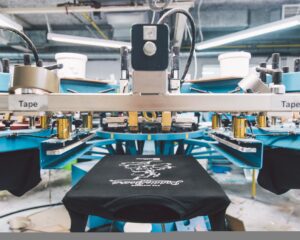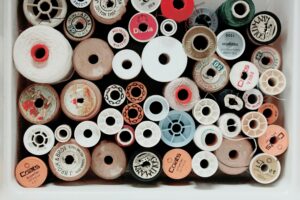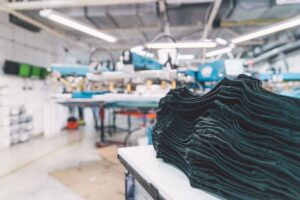Cotton t-shirt production, a ubiquitous aspect of the fashion industry, is unfortunately associated with significant water waste. Traditional cotton cultivation, dyeing processes, and manufacturing contribute to an environmental toll that has sparked concerns worldwide. Let’s delve into the specific stages of cotton t-shirt production where water waste is most pronounced:
1. Cotton Cultivation
Traditional cotton farming is notorious for its water-intensive nature. Conventional cotton, which constitutes the majority of global cotton production, often relies on irrigation systems that draw heavily from local water sources. This practice places a strain on water availability in regions where cotton is grown, contributing to over-extraction and depletion of water tables.
Solution: Teemill’s Organic Cotton
Teemill takes a different route by utilizing organic cotton. Sourced from regions with abundant rainfall, such as the North of India where monsoon rains prevail, Teemill’s organic cotton minimizes reliance on irrigation. This eco-friendly approach ensures the water needed for crop growth is obtained sustainably, mitigating the negative impact associated with conventional cotton farming.
2. Dyeing Processes
The dyeing phase in cotton t-shirt production is also notorious for its water consumption and pollution. Conventional dyeing methods often involve vast quantities of water to disperse and fix color on fabrics. Moreover, the chemicals used in these processes can contaminate the water, leading to significant environmental pollution.
Solution: Teemill’s Closed-Loop System
Teemill addresses this issue with a closed-loop system for dyeing. Water used in the dyeing process is not treated as a disposable resource. Instead, it undergoes a meticulous recovery and purification process. Teemill’s commitment to a closed-loop system ensures that a substantial percentage of water is recirculated, minimizing both water wastage and the potential for pollution.
3. Manufacturing and Finishing
The manufacturing stage of cotton T-shirt production also contributes to water waste. Processes such as washing, finishing, and quality control often require large amounts of water, particularly in conventional factories where sustainable practices may be overlooked.
Solution: Teemill’s Circular Fashion Approach
Teemill tackles water waste in manufacturing by adopting a circular fashion approach. Every Teemill product is designed with a second life in mind. When a t-shirt reaches the end of its wear cycle, Teemill encourages customers to return it. The recycled material is then used to create new products, minimizing the need for virgin resources and reducing water consumption in the manufacturing process.
In the traditional landscape of cotton T-shirt production, water waste is a critical issue that demands attention. Teemill’s commitment to sustainability stands as a beacon of change in the industry. Through the use of organic cotton, a closed-loop system in dyeing, and a circular fashion approach, Teemill is actively addressing the water waste associated with cotton T-shirt production. By choosing Teemill, y’all get to align with a brand that prioritizes environmental responsibility and contributes to a more sustainable future for fashion.






